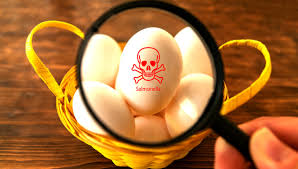
DiYES International School – Salmonella Outbreak Eggs have raised major alarm as more than 95 people across 14 states have fallen ill since January. The situation became public after federal health authorities confirmed that the cause is linked to tainted eggs distributed by Country Eggs LLC in California. These eggs were sold under multiple brand names and have now been recalled. The infected individuals began showing symptoms between early January and late July. The Centers for Disease Control and Prevention has urged consumers to check their refrigerators and act immediately if any recalled items are found. With 18 people hospitalized, this outbreak is one of the most concerning food safety incidents of the year. Symptoms vary from vomiting and diarrhea to serious complications requiring urgent care. As more details emerge, officials stress the importance of public vigilance to prevent further infections.
Investigations into the Salmonella Outbreak Eggs began when multiple patients across different states reported severe gastrointestinal issues. The U.S. Food and Drug Administration worked in coordination with the CDC to trace the origin of the contaminated eggs. Their findings pointed directly to Country Eggs LLC located in Lucerne Valley, California. This company produced large, brown cage-free eggs labeled as “sunshine yolks” and “omega-3 golden yolks.” These eggs were packaged under several retail names including Nagatoshi Produce, Mishuo, and Nijiya Markets. All cartons bore the code CA 7695 with sell-by dates ranging from July 1 to September 16. This discovery helped isolate the source and enabled a targeted recall. Salmonella Outbreak Eggs remain a health hazard until all products are removed from shelves and household kitchens nationwide. Continued surveillance and consumer awareness are necessary to contain the situation.
“Read about: Parents Beware: West Nile Virus Strikes Children in New Alarming Outbreak!”
The eggs linked to the outbreak were distributed widely to both grocery stores and food service companies. This extensive distribution network has heightened concerns, making it difficult to gauge how many people have come in contact with the contaminated products. Consumers are advised to look for packaging details such as the CA 7695 code and sell-by dates from early July to mid-September. If any of these cartons are found, they should be discarded or returned to the place of purchase. Retailers have already been instructed to pull the items from shelves. The presence of Salmonella Outbreak Eggs in homes still poses a risk, especially to vulnerable groups like children, elderly people, and those with compromised immune systems. It is crucial to handle eggs with care, maintain proper hygiene, and stay informed through official updates from the CDC and FDA. Public cooperation can drastically reduce the spread of illness.
Exposure to Salmonella Outbreak Eggs can result in a wide range of symptoms that generally appear within hours to days. Most commonly, individuals experience diarrhea, vomiting, stomach cramps, and high fever. These symptoms usually last about a week. While many recover without medical intervention, the illness can be dangerous in certain populations. Children, seniors, and immunocompromised individuals may suffer complications that require hospitalization. In this outbreak, 18 people have needed hospital treatment due to severe dehydration and prolonged infection. It is essential to stay hydrated and seek medical care if symptoms worsen. The CDC has issued guidelines to help identify early signs and manage infections effectively. Education on foodborne illnesses and safe handling practices can help minimize future cases. Understanding the dangers of Salmonella Outbreak Eggs is key to avoiding long-term health consequences and protecting family members.
If you suspect that Salmonella Outbreak Eggs are present in your kitchen, act immediately. First, inspect the egg cartons for the product code CA 7695 and any sell-by dates from July 1 to September 16. Do not consume these eggs under any circumstances. If identified, place them in a sealed bag and dispose of them properly, or return them to the store. Clean any surfaces and kitchenware that may have come into contact with the eggs using hot, soapy water. Wash your hands thoroughly after handling. If you or anyone in your household begins to feel ill, monitor symptoms and contact a healthcare provider if they intensify. Keep informed by checking CDC alerts and food safety notices. Public health depends on prompt action from individuals. Reducing the spread of Salmonella Outbreak Eggs relies on community cooperation, responsible disposal, and awareness of potential contamination risks.